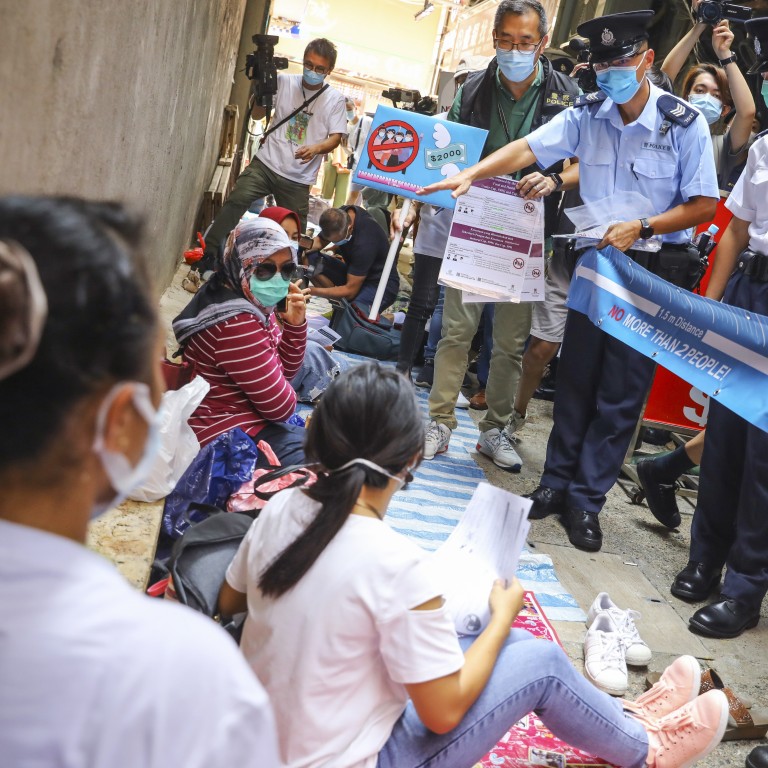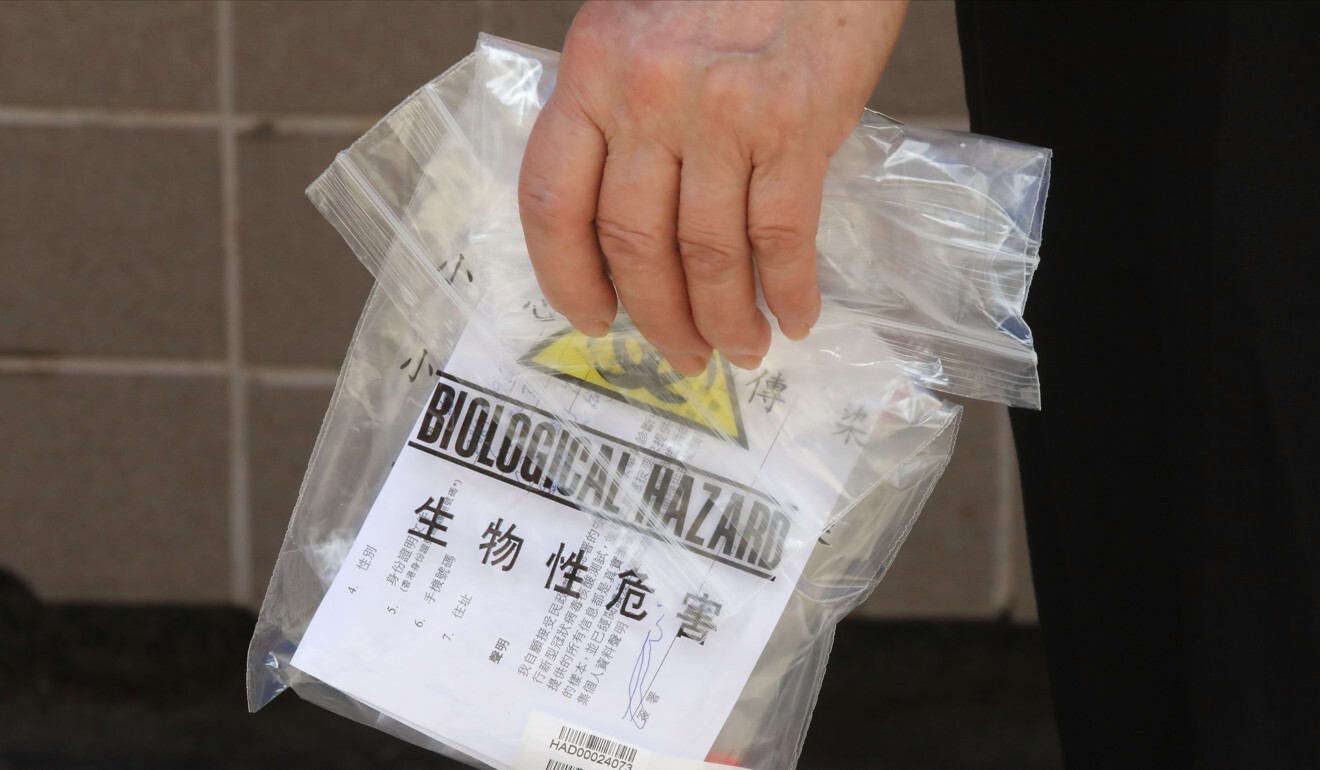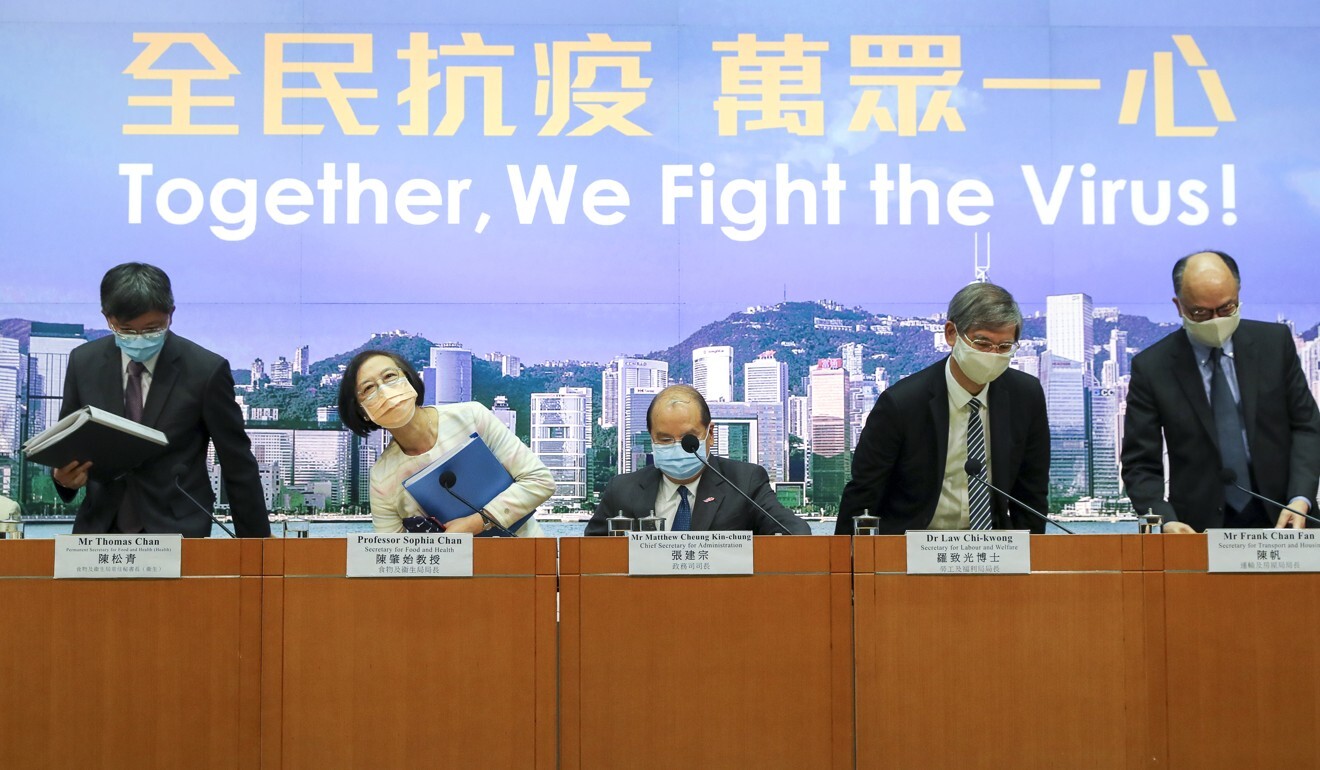
Hong Kong third wave: city’s top officials unite behind universal Covid-19 testing scheme even as some in opposition camp hope to derail it
- Officials drum up support for programme, to start September 1, assuring public of data privacy and urging residents to put aside bias and distrust
- But even as city government presented a united front, some opposition councillors were handing out leaflets arguing it was a waste of funds
On Sunday, the city’s No 2 official, Matthew Cheung Kin-chung, health minister Professor Sophia Chan Siu-chee and Financial Secretary Paul Chan Mo-po used their blogs to appeal to the public to take part in the programme. Civil service minister Patrick Nip Tak-kuen appeared on a television programme to do the same, saying 3,000 medical professionals had already signed up to run the scheme.
But as they made their case, several opposition district councillors, including Tsuen Wan’s Roy Tam Hoi-pong and Sai Kung’s Gary Fan Kwok-wai, were handing out fliers outside the Tin Hau MTR station, urging residents not to take part in the programme, arguing it was not cost effective.
They pledged to mobilise more district councillors to set up street booths in coming days to push against the testing, expressing concerns that participants’ DNA data would be sent across the border – fears local authorities have repeatedly rejected.
What you need to know about Hong Kong’s universal Covid-19 tests
Despite the government’s efforts, critics such as Dr Alfred Wong Yam-hong from doctors’ concern group Medecins Inspires have been sceptical of the scheme. Wong said if a test returned a false positive, it would inflict unnecessary stress on the person taking it.
Writing in his Sunday blog post to drum up support for the programme, Chief Secretary Cheung said: “The more participants in the programme, the faster we will be able to identify the asymptomatic patients, cut the transmission chain, help Hong Kong contain the outbreak and put the economy and society back on the right track.”
He appealed to people to take part, not just for themselves, but for the sake of their families.
The universal testing, voluntary and free for Hong Kong residents, is expected to end two weeks after its September 1 start date.

Under the scheme, any resident above the age of six without coronavirus symptoms is eligible to register online. Participants must provide their name, ID card number and preferred time slot and swabbing station, where medical professionals will collect nose and throat samples.
Last week, Chief Executive Carrie Lam Cheng Yuet-ngor stressed she had not set a turnout target for the scheme, even after health minister Chan said she expected 4-5 million people to seize the opportunity.
In her Sunday blog post, Chan said she hoped medical professionals and the public could put aside “bias and conspiracy theories” and work together to bring the pandemic under control.
“Let’s put public health and people’s betterment before personal stances,” she wrote.
Hongkongers urged to stay at home to ensure Covid-19 testing works
It would be difficult to relax social-distancing measures with invisible transmission still occurring within the community, she said, adding that 22.6 per cent of the city’s coronavirus patients were either asymptomatic or had very mild symptoms.
A commentary by the Chinese state-run People’s Daily weighed in as well, saying that smearing Beijing’s efforts to help in Hong Kong’s fight against Covid-19 was tantamount to selling out the well-being of Hongkongers.
Three mainland biotech firms will play a prominent role in the massive testing scheme.
Finance chief Chan said that, with Beijing’s support, Hong Kong’s testing capacity had increased significantly. The city now had about 3,000 beds in its isolation and quarantine facilities, he noted, a number that would go up to about 5,000 by the end of this year.
Nip, the civil service chief who is heading up the testing programme’s logistics, meanwhile, said on a TV show that at least 100 community testing centres – including community halls, schools and sports facilities – would be set up to conduct the tests.
Staff from the Department of Health and the city’s Electrical and Mechanical Services Department would conduct site visits beforehand to assess air ventilation systems and ensure necessary spacing for social distancing existed at the proposed venues.
More than 3,000 staff members from the medical sector had already indicated their interest to help with the sample collection, while both current and retired public servants had been recruited for administrative work at the centres, he added.
Hong Kong’s low-income residents suffering disproportionately under strain of pandemic, with relief doing little to help, survey finds
Nip reiterated that only serial numbers, rather than personal information, would be labelled on sample bottles, and even these would not be shipped out of Hong Kong. That information would be destroyed within a month’s time.
Meanwhile, Chinese University Professor David Hui Shu-cheong, an adviser to the government on the pandemic response, said the number of new infections reported on Sunday was “not a good sign”, as the figure had been dropping very slowly.
The average number of daily new infections over the past week was about the same as the peak level during the outbreak’s second wave, he said.

Hui also dismissed the idea that September 1 was too late in the pandemic’s course to implement a universal testing scheme, pointing to daily infection tallies he said remained high.
And while conceding it would be ideal if those taking the test could be forced to stay home, he said implementing that would be exceedingly difficult.
Separately, health authorities announced at a daily briefing that of the 25 new infections, six were imported: one from Bangladesh, four from India, and a seafarer arriving on a vessel coming from Malaysia.
The origins of eight of the 19 local cases had not yet been traced.
At the Hong Chi Lei Muk Shue Hostel in Kwai Chung, home to 45 residents with moderate to high-level intellectual disabilities, three of about 50 employees were confirmed to be infected.
All of the facility’s residents and entire staff would now have to be quarantined, said Dr Chuang Shuk-kwan from the Centre for Health Protection, noting the difficulties faced in ensuring residents used masks properly.
An Indonesian domestic worker, meanwhile, who had been admitted to the Pamela Youde Nethersole Eastern Hospital about a month ago because of leukaemia, tested preliminarily positive for Covid-19 on Sunday.
Fifty-two patients were identified as close contacts of the helper because they shared the same wards. The maid’s employer had earlier been infected with the coronavirus but had since been discharged.
Health authorities admitted the domestic worker should have been quarantined when her employer was found to be infected, something that had not taken place.



